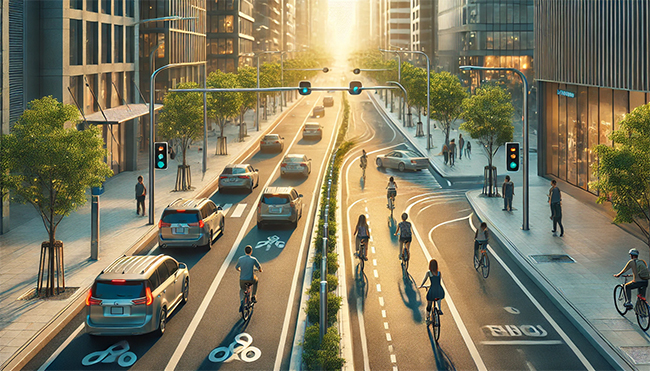by Marvin Ramírez
San Francisco has long prided itself on being a progressive, forward-thinking city, but in recent years, that progress has come at the expense of drivers, small businesses, and common sense. Nowhere is this more evident than in the disastrous decision to remove parking on Valencia Street to make way for a bike lane that has wreaked havoc on the local economy. This controversial move has made life harder for business owners and patrons alike, all while catering to a small but politically influential group of cyclists who neither pay road taxes nor contribute to the local economy in the way drivers do. This blatant prioritization of cyclists over working-class citizens and business owners is not just an inconvenience—it is outright unfair.
The loss of parking on Valencia Street
Valencia Street has historically been a bustling hub of small businesses, cozy restaurants, vibrant cafes, and entertainment venues that have thrived for decades thanks to accessible parking. However, when the San Francisco Municipal Transportation Agency (SFMTA) decided to remove parking spaces and install a center-running bike lane, they effectively drove a dagger into the heart of this once-thriving commercial corridor. Businesses that relied on easy customer access saw foot traffic dwindle. Some restaurants and shops even closed permanently due to declining sales. The justification? Alleged improvements to cyclist safety, despite the fact that these same cyclists do not contribute to street maintenance costs the way drivers do.
A better alternative ignored
The reality is that the SFMTA had a much better alternative but chose to ignore it. South Van Ness, a nearby street with wide lanes and ample space, would have been a far superior location for the bike lanes. It could have accommodated both cyclists and four lanes of vehicular traffic without the need to strip Valencia of its lifeblood—parking. But instead, the city’s transportation planners pushed forward with a misguided agenda, disregarding the concerns of the business community and prioritizing the demands of an organized and politically influential bike coalition. This coalition has managed to wield enough influence over city politicians to force through policies that harm drivers and businesses, all for the sake of an idealized urban vision that does not align with reality.
The broader war on cars
The Valencia Street debacle is just one example of San Francisco’s broader war on cars. Over the past decade, thousands of parking spaces have been systematically eliminated under the guise of “public safety” and “environmental responsibility.” However, the truth is much more sinister. The removal of parking spots is not about safety—it is about control and revenue generation. The city’s bureaucrats have realized that making it harder for people to drive and park is an effective way to force compliance with their urban planning fantasies while simultaneously extracting more money from hardworking citizens through citations, increased parking fees, and extended meter hours.
Cash grab through parking enforcement
And now, in yet another blow to drivers, the city is extending parking meter enforcement until 10 p.m. and including Sundays. This move is nothing short of a cash grab, designed to milk more money from residents who are already struggling with the high cost of living. It disrupts people’s lives, making it harder to enjoy an evening out without worrying about a parking ticket or the added expense of constantly feeding a meter. Who benefits from this? Certainly not the average San Franciscan who simply wants to support local businesses, go out for dinner, or visit friends without being financially penalized.
Too little, too late
The recent reversal of the center-running bike lane experiment on Valencia is too little, too late. While the city now plans to move the bike lanes to the side of the street, this redesign still eliminates nearly 80 parking and loading spaces. This means that while business owners and patrons may see some minor relief, they will continue to suffer from reduced access and limited parking options. The city’s so-called “solution” does not address the root of the problem—it merely shifts the burden slightly while continuing to punish drivers.
Government disconnected from the people
What we are witnessing is a city government that has become too big, too unaccountable, and too disconnected from the needs of its citizens. Rather than serving the people, it seems more interested in pushing ideological agendas that favor niche interest groups at the expense of everyone else. San Francisco’s politicians and bureaucrats need to remember that their salaries are funded by taxpayers—many of whom rely on their cars for work, errands, and daily life. They need to understand that their policies are not just inconveniences; they are actively harming the livelihoods of the very people they claim to represent.
A Common-sense solution
The solution is simple: prioritize practicality over ideology. Instead of waging war on drivers and small businesses, city officials should focus on common-sense transportation policies that serve the majority of residents. This means choosing appropriate streets for bike lanes, preserving essential parking for businesses, and ensuring that any changes to infrastructure are made with input from all affected parties—not just the loudest and most politically connected voices in the room.
A better future for San Francisco
If San Francisco truly wants to thrive, it must stop punishing drivers and start listening to the people who make the city what it is. It should also build more public parking spaces, as was done in the early 1990s with the Bartlett and 21st Street parking structure, which included affordable housing above it—a solution pioneered by MEDA. This approach benefits both residents and businesses while addressing transportation and housing challenges in a balanced way.



